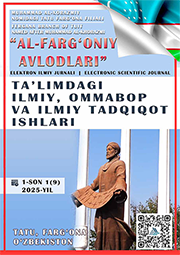Анализ корпуса универсального дерева зависимостей узбекского языка в би-аффинной нейронной модели
Ключевые слова:
синтаксический анализ зависимостей, би-аффинное внимание, Узбекский язык, низкоресурсные языки, нейронные сети, Universal Dependencies, BiLSTMАннотация
Данная статья посвящена исследованию глубокого биаффинного нейронного парсинга зависимостей для узбекского языка с использованием корпуса универсальных зависимостей (Universal Dependency treebank). Подробно обсуждаются ключевые аспекты модели, включая слои внимания, архитектуру сети, параметры выпадения встраивания и параметры оптимизации (например, оптимизатор Adam). Экспериментальные результаты показывают, что модель с би-аффинным вниманием достигает показателей UAS 79,5% и LAS 72,4%, существенно превосходя базовый транзитивный парсер на 6,7% (UAS) и 7,4% (LAS).
Библиографические ссылки
Ryan McDonald, Fernando Pereira, Kiril Ribarov, and Jan Hajič. 2005. Non-Projective Dependency Parsing using Spanning Tree Algorithms. In Proceedings of Human Language Technology Conference and Conference on Empirical Methods in Natural Language Processing, pages 523–530, Vancouver, British Columbia, Canada. Association for Computational Linguistics.
Joakim Nivre. 2008. Algorithms for Deterministic Incremental Dependency Parsing. Computational Linguistics, 34(4):513–553.
Dozat, T., & Manning, C. D. (2016, November 6). Deep biaffine attention for neural dependency parsing. arXiv.org. https://arxiv.org/abs/1611.01734
Eliyahu Kiperwasser and Yoav Goldberg. 2016. Simple and Accurate Dependency Parsing Using Bidirectional LSTM Feature Representations. Transactions of the Association for Computational Linguistics, 4:313–327.
Arofat Akhundjanova, & Luigi Talamo (2025). Universal Dependencies Treebank for Uzbek. In Proceedings of the Third Workshop on Resources and Representations for Under-Resourced Languages and Domains (RESOURCEFUL-2025) (pp. 1–6). Association for Computational Linguistics.
Bahdanau, D., Cho, K., & Bengio, Y. (2014, September 1). Neural machine translation by jointly learning to align and translate. arXiv.org. https://arxiv.org/abs/1409.0473
Vaswani, A., Shazeer, N., Parmar, N., Uszkoreit, J., Jones, L., Gomez, A. N., Kaiser, L., & Polosukhin, I. (2017, June 12). Attention is all you need. arXiv.org. https://arxiv.org/abs/1706.03762
Diederik Kingma and Jimmy Ba. 2014. Adam: A method for stochastic optimization. International Conference on Learning Representations.
Chris Dyer, Miguel Ballesteros, Wang Ling, Austin Matthews, and Noah A. Smith. 2015. Transition-Based Dependency Parsing with Stack Long Short-Term Memory. In Proceedings of the 53rd Annual Meeting of the Association for Computational Linguistics and the 7th International Joint Conference on Natural Language Processing (Volume 1: Long Papers), pages 334–343, Beijing, China. Association for Computational Linguistics.
Загрузки
Дополнительные файлы
Опубликован
Как цитировать
Лицензия
Copyright (c) 2025 Sanatbek Matlatipov

Это произведение доступно по лицензии Creative Commons «Attribution» («Атрибуция») 4.0 Всемирная.












